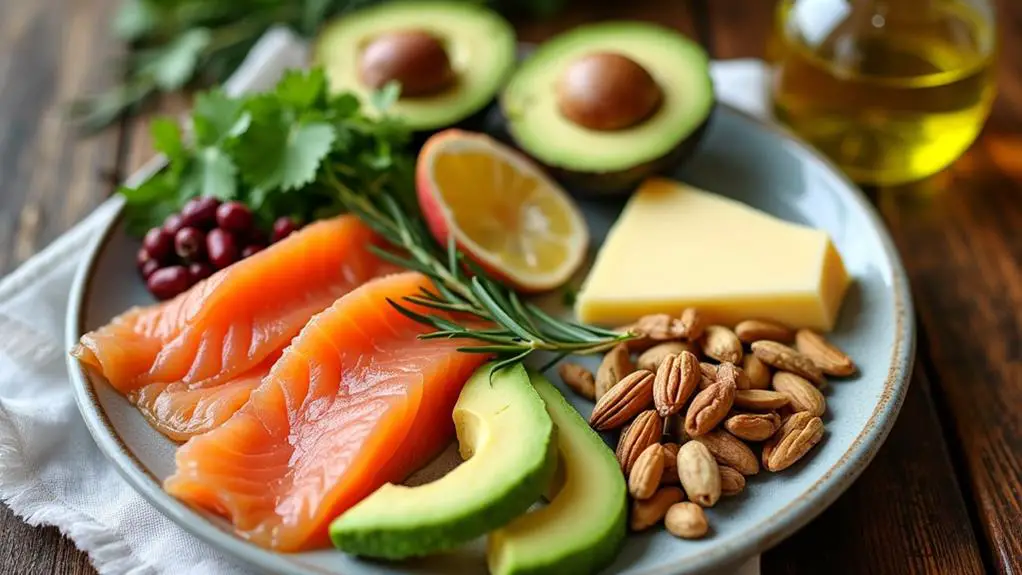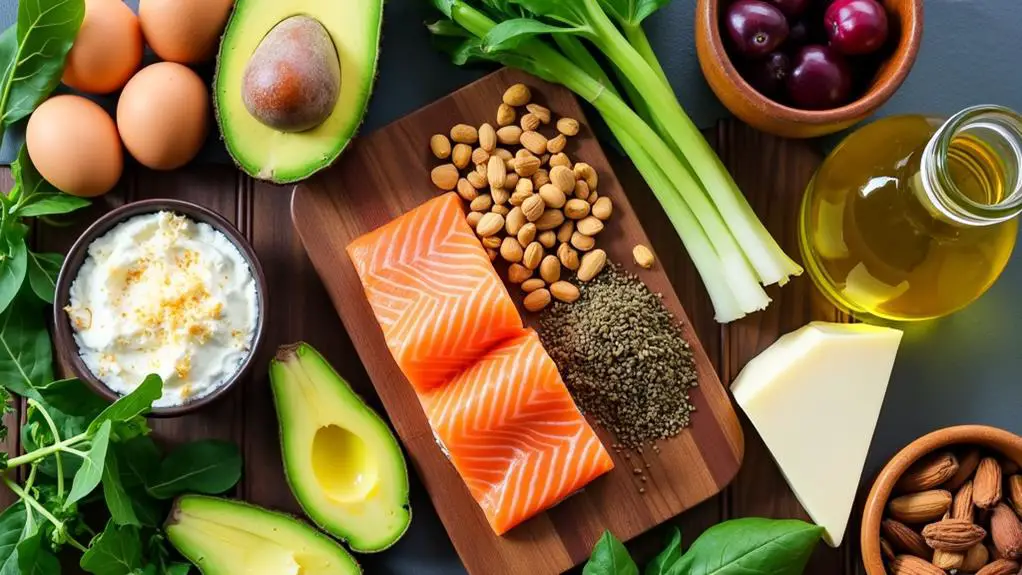
On a ketogenic diet, fat should constitute 70-80% of your daily caloric intake. For someone consuming 2000 calories a day, this translates to roughly 155-178 grams of fat. Sourcing fats from healthy options like avocados, nuts, olive oil, and fatty fish can promote sustained energy, satiety, and cardiovascular health. It's vital to balance these fats with moderate protein intake (10-20%) and minimal carbohydrates (5-10%) to maintain ketosis and optimize metabolic health. Adequate planning and monitoring can guarantee nutrient diversity, supporting long-term adherence and effectiveness. To explore further, more thorough insights into macronutrient balance are necessary.
Key Takeaways
- Aim for 70-80% of your daily calories from fats on a ketogenic diet.
- For a 150-pound individual, this translates to approximately 189 grams of fat daily.
- Prioritize healthy fats like avocados, nuts, olive oil, and fatty fish.
- Regularly monitor and adjust fat intake to maintain ketosis and meet nutritional needs.
- Avoid unhealthy fats to support cardiovascular health while on the keto diet.
Understanding the Keto Diet
The ketogenic diet, commonly referred to as the keto diet, is a meticulously structured nutritional regimen that emphasizes a high-fat, low-carbohydrate intake to promote the metabolic state of ketosis. This diet typically consists of approximately 70-80% fat, 5-10% carbohydrates, and 10-20% protein.
By markedly reducing carbohydrate intake to less than 50 grams per day, the body begins to produce ketones from stored fat within 3-4 days, shifting from using glucose to fat as its primary energy source. The keto diet promotes weight loss by utilizing fat for energy, leading to rapid fat loss and improved body composition. Additionally, it has been linked to better blood sugar control and lower insulin levels, vital for managing metabolic conditions.
Despite its growing popularity, there are several keto misconceptions and common challenges associated with the diet. One prevalent misconception is that any high-fat food can be consumed without consideration of its nutritional value. However, the quality of fat is essential; healthy fats from sources like avocados, nuts, and olive oil are preferable over processed fats.
Another common challenge is managing the initial shift phase, often referred to as "keto flu," characterized by fatigue, irritability, and headaches as the body adapts to ketosis.
Long-term adherence to the keto diet requires careful planning to guarantee nutrient diversity and prevent deficiencies, given the exclusion of many carbohydrate-rich foods like grains, fruits, and starchy vegetables.
Importance of Fat Intake
The importance of fat intake on a ketogenic diet lies in its role as the primary energy source, necessitating that approximately 70-80% of total daily calories come from fats to facilitate the metabolic shift from carbohydrates.
Protein intake should be monitored to guarantee it supports muscle maintenance and overall health.
Maintaining macronutrient balance by limiting carbohydrates to less than 50 grams per day and consuming moderate protein is vital to sustaining ketosis.
Choosing healthy fats from sources such as avocados, nuts, and olive oil not only supports metabolic health but also enhances satiety, aiding in effective weight management.
Energy Source Shift
A pivotal aspect of the ketogenic diet lies in its strategic shift towards fats as the primary energy source, fundamentally altering metabolic pathways. This fat adaptation leads to enhanced energy efficiency, as the body shifts from using glucose to utilizing ketones derived from stored fat. Typically, a ketogenic diet consists of 70-80% of total daily calories from fats, with carbohydrates restricted to less than 50 grams per day. After approximately 3-4 days of low carbohydrate intake, the body enters a state of ketosis, where ketones provide a steady and efficient fuel source.
Adequate dietary fat intake is vital for maintaining energy levels and supporting metabolic processes during this adaptation phase. Consuming a balanced mix of healthy fats, including monounsaturated and polyunsaturated fats, is essential not only for energy but also for promoting heart health by reducing inflammation and improving lipid profiles.
| Type of Fat | Sources | Benefits |
|---|---|---|
| Monounsaturated | Avocados, olive oil, nuts | Reduces inflammation |
| Polyunsaturated | Fatty fish, flaxseeds, walnuts | Improves lipid profiles |
| Saturated | Coconut oil, butter, cheese | Provides quick energy |
| Trans | Processed snacks, margarine | Should be avoided |
Monitoring fat intake guarantees the body remains in ketosis, achieved by incorporating a variety of fat sources to meet macronutrient goals.
Macronutrient Balance
Achieving the correct macronutrient balance is paramount for the success of a ketogenic diet, particularly in relation to fat intake. The ketogenic diet necessitates a macronutrient distribution of approximately 70-80% fat, 5-10% carbohydrates, and 10-20% protein to sustain ketosis. This balance is critical to promote effective fat metabolism, where the body shifts from using glucose to utilizing stored fats as its primary energy source.
For example, a 150-pound individual may require around 189 grams of fat daily, adjusted according to their specific caloric needs and activity levels.
Crucially, managing protein intake to about 20-25% of total daily calories is essential to prevent gluconeogenesis, a process where excess protein is converted into glucose, potentially disrupting ketosis. Regular monitoring and dietary adjustments are necessary to guarantee cardiovascular health and maintain a balanced intake of diverse fats, particularly prioritizing unsaturated fats.
This meticulous approach to macronutrient balance not only supports ketosis but also promotes overall health, underscoring the importance of fat intake in a ketogenic diet. Effective fat metabolism and strategic dietary adjustments are central to achieving and sustaining the benefits of this dietary regimen.
Healthy Fat Choices**
Balancing macronutrients is fundamental to the success of a ketogenic diet, and attention must now be given to the quality of fats consumed. Approximately 70-80% of total daily calories should come from fats, underscoring the importance of nutrient density and ideal fat digestion. Healthy fat choices include avocados, nuts, seeds, olive oil, and fatty fish, which not only provide essential nutrients but also support metabolic function. Incorporating medium-chain triglycerides (MCTs) from sources like coconut oil can enhance ketosis and promote weight loss, making them a popular option in keto meal plans.
Consuming a variety of healthy fats contributes to satiety and aids in the absorption of fat-soluble vitamins (A, D, E, K), vital for overall health. Limiting unhealthy fats, such as trans fats and processed saturated fats, while focusing on whole food sources can greatly improve heart health and reduce disease risk, aligning with the goals of a ketogenic diet.
| Food Source | Type of Fat | Health Benefits |
|---|---|---|
| Avocados | Monounsaturated fats | Supports heart health, high in potassium |
| Nuts and Seeds | Polyunsaturated fats | Rich in omega-3s, supports brain function |
| Olive Oil | Monounsaturated fats | Anti-inflammatory properties |
| Fatty Fish | Omega-3 fatty acids | Enhances brain function, reduces inflammation |
Recommended Fat Ratios

To maintain ketosis effectively, the ketogenic diet typically prescribes a macronutrient ratio of 70-80% fat, 5-10% carbohydrates, and 10-20% protein.
Emphasis should be placed on consuming high-quality fat sources such as avocados, nuts, and olive oil, while limiting unhealthy fats.
Regularly reassessing your macro needs is essential due to changes in activity levels or goals.
Balancing these macronutrients is imperative for achieving the desired metabolic state and ensuring overall nutritional adequacy.
Optimal Fat Percentage
Understanding the ideal fat percentage on a ketogenic diet is vital for maintaining effective ketosis and achieving desired health outcomes. The ketogenic diet typically recommends a macronutrient distribution of approximately 70-80% fat, 5-10% carbohydrates, and 10-20% protein. This high-fat ratio facilitates fat adaptation, enabling the body to shift its primary energy source from glucose to fat, thereby enhancing fat metabolism.
For effective ketosis, individuals should aim to consume less than 50 grams of total carbohydrates daily. A 150-pound individual, for instance, may target around 189 grams of fat daily, tailored to their specific caloric needs and activity levels.
It's worth noting that variations exist within ketogenic plans; some advocate for more aggressive approaches with fat percentages ranging from 75-90% to deepen ketosis.
Monitoring fat types is also critical. Emphasis should be placed on unsaturated fats, which should constitute 70-75% of total fat intake, while saturated fats should be limited to less than 10% of daily caloric intake.
This balanced approach guarantees that while individuals achieve the metabolic benefits of ketosis, they also maintain overall nutritional health, minimizing potential negative impacts associated with high saturated fat consumption.
Healthy Fat Sources
Incorporating healthy fat sources is essential for optimizing the benefits of a ketogenic diet, as it guarantees the intake of important nutrients while maintaining ketosis. A balanced macronutrient distribution typically involves 70-80% of daily caloric intake from fats, which translates to approximately 189 grams for a 150-pound individual, contingent upon specific energy requirements and dietary goals.
To maintain nutrient density and prevent deficiencies, a variety of fats should be included. Avocados, rich in monounsaturated fats and potassium, are an excellent choice. Nuts, such as almonds and walnuts, provide not only healthy fats but also essential fatty acids and fiber.
Incorporating olive oil, known for its heart-healthy properties and antioxidants, can further enhance the nutritional profile of the diet.
Fatty fish, such as salmon and sardines, are critical for their omega-3 fatty acids, which support cardiovascular health and reduce inflammation. Medium-chain triglycerides (MCTs) from sources like coconut oil can be particularly beneficial during the adaptation phase, enhancing ketone production and sustaining energy levels.
Balancing Macronutrients
Balancing macronutrients is a critical aspect of a successful ketogenic diet, ensuring that the body remains in a state of ketosis while receiving necessary nutrients. On a ketogenic diet, the recommended macronutrient distribution consists of 70-80% of total daily calories from fat, 5-10% from carbohydrates, and 10-20% from protein.
For a standard 2,000-calorie diet, this translates to approximately 155-178 grams of fat, 25-50 grams of carbohydrates, and 50-100 grams of protein daily.
Maintaining moderate protein intake is essential to prevent gluconeogenesis, where excess protein converts to glucose, potentially disrupting ketosis. Fat adaptation, where the body efficiently uses fat as its primary energy source, is a key goal of this diet. Consequently, fat sources should come mainly from healthy options such as avocados, nuts, seeds, and oils, while minimizing saturated and trans fats from processed foods.
Additionally, regular monitoring of dietary fat intake is indispensable for cardiovascular health, particularly in balancing saturated fats with unsaturated fats.
Macronutrient cycling, which involves varying the intake of fats, proteins, and carbohydrates periodically, can also be beneficial for long-term adherence and metabolic flexibility. Understanding these ratios and adjustments will optimize the ketogenic diet's efficacy and sustainability.
Types of Healthy Fats
A ketogenic diet thrives on the inclusion of various healthy fats, integral for both achieving and maintaining ketosis. Prioritizing nutrient density and optimizing fat absorption are essential components of a successful keto regimen. Unsaturated fats from sources such as avocados, olive oil, and fatty fish not only promote heart health but also deliver essential nutrients that support overall wellness.
Nuts and seeds, like walnuts, almonds, and flaxseeds, serve as excellent sources of omega-3 fatty acids and fiber, enhancing both cardiovascular health and digestive function. Coconut oil, rich in medium-chain triglycerides (MCTs), can boost ketone production, consequently facilitating the maintenance of ketosis.
Incorporating fatty cuts of meat, such as grass-fed beef and pork belly, is another strategic approach to meeting daily macronutrient goals while ensuring satiety. It's important to focus on the quality of fats, minimizing intake of trans fats and unhealthy saturated fats commonly found in processed foods, as they are associated with increased health risks.
| Fat Source | Type of Fat | Benefits |
|---|---|---|
| Avocados | Monounsaturated | Heart health, nutrient density |
| Fatty Fish | Omega-3 Unsaturated | Anti-inflammatory, heart health |
| Coconut Oil | MCTs | Enhances ketosis, fat absorption |
| Grass-Fed Beef | Saturated/Monounsaturated | Satiety, nutrient-dense |
Foods to Include

To optimize the ketogenic diet, it is essential to include a diverse array of nutrient-dense, high-fat foods. A well-structured keto diet should aim for a macronutrient distribution of approximately 70-80% fat, 5-10% carbohydrates, and 10-20% protein to sustain ketosis.
Incorporating foods rich in healthy fats, such as avocados, nuts (walnuts and almonds), seeds (flax and chia), and olive oil, is imperative. These foods not only provide essential nutrients but also support heart health.
Fatty fish, including salmon and sardines, are excellent additions due to their high omega-3 fatty acid content and quality protein, both critical for overall health. Full-fat dairy products, such as cheese and Greek yogurt, contribute appreciably to fat intake while offering calcium and probiotics beneficial for gut health.
The inclusion of coconut oil and MCT oil can further enhance ketone production and support energy levels, thanks to their medium-chain triglycerides.
Effective nutrient timing and portion control are paramount to maintaining the delicate balance required for a successful ketogenic diet. Including whole, unprocessed foods can further enhance overall nutrition and guarantee dietary compliance.
Foods to Avoid
While incorporating nutrient-dense, high-fat foods is fundamental to a ketogenic diet, it is equally important to recognize and avoid certain foods that can compromise ketosis. One of the primary categories of foods to avoid includes grains. Due to their high carbohydrate content, grains such as wheat, rice, oats, and barley can greatly impede the body's ability to maintain ketosis.
Additionally, sugars, including both added sugars and many sugar alternatives, must be eliminated, as they can spike insulin levels and disrupt the metabolic process of fat burning. Non-starchy vegetables like cauliflower and broccoli are better suited for ketosis compared to high-carb vegetables.
Starchy vegetables like potatoes, corn, and peas are also high in carbohydrates and should be avoided to keep daily carb intake below 50 grams. Similarly, fruit restrictions are necessary; most fruits contain natural sugars that can hinder ketosis, with only small portions of low-carb fruits like berries being permissible.
Legumes, including beans and lentils, also pose a challenge due to their high carbohydrate content. Their consumption can similarly disrupt ketosis, making them another food group to avoid.
Potential Side Effects

Starting on a ketogenic diet can induce several potential side effects that warrant careful consideration and management. One common short-term issue is the "keto flu," which may manifest as fatigue, headaches, nausea, irritability, and brain fog as the body shifts into ketosis. These symptoms typically subside within the first few weeks but can be quite challenging initially. Symptoms can appear within the first few days after reducing carbs and might last from a few days to a month, depending on individual adaptation. Monitoring your symptoms can help facilitate a smoother change to keto.
Electrolyte imbalances are another concern due to reduced carbohydrate intake, which can lead to muscle cramps, dizziness, and other discomforts. Supplementation with sodium, potassium, and magnesium is often recommended to mitigate these effects.
Additionally, long-term adherence to a ketogenic diet poses risks such as kidney stones, osteoporosis, and heightened uric acid levels, underscoring the need for ongoing dietary planning and monitoring.
Maintaining the diet can also present significant challenges due to the limited variety of foods allowed, potentially leading to cravings and feelings of deprivation. This can make it difficult for some individuals to adhere to the diet long-term.
Regular consultation with a registered dietitian is advisable to address nutrient deficiencies and guarantee a balanced intake of essential vitamins and minerals while following the ketogenic diet. Such professional guidance is vital for minimizing the potential long-term risks associated with this dietary approach.
Tips for Adherence
Addressing the potential side effects associated with a ketogenic diet is vital for successful adherence and long-term sustainability. To maintain ketosis effectively, aim for a macronutrient distribution of 70-80% fat, 5-10% carbohydrates, and 10-20% protein. This balance helps in preventing nutrient deficiencies and maintaining energy levels.
Effective meal planning is necessary for adhering to a ketogenic diet. Incorporate a variety of healthy fat sources such as avocados, nuts, olive oil, and fatty fish to diversify your diet. Preparing meals in advance guarantees you have keto-friendly options readily available, reducing the temptation to consume high-carb foods. High-fat snacks like cheese or nut butter can help curb cravings and sustain energy levels throughout the day. Follow a categorized grocery list to streamline shopping and prevent impulse buys.
Monitoring your food intake is essential; utilize tracking apps to make certain you stay within your carbohydrate limit, ideally under 50 grams per day. These tools can help you keep a consistent check on your macronutrient distribution.
Consulting with a registered dietitian can provide personalized advice and strategies to help you meet your dietary goals and effectively adhere to the ketogenic lifestyle. This professional guidance can help tailor meal planning and snack ideas to your specific needs, further enhancing adherence and long-term success.
Frequently Asked Questions
How Much Fat Should I Eat per Day on Keto?
For a ketogenic diet, your daily intake of fat should range between 70-80% of total calories. Prioritize healthy fat sources like avocados, nuts, and olive oil to meet nutritional targets and maintain ketosis effectively.
What Happens if You Don't Eat Enough Fat on Keto?
Insufficient fat intake impedes ketosis maintenance and fat adaptation, leading to decreased energy levels and ineffective hunger management. Additionally, it can disrupt nutrient balance and complicate meal planning, potentially causing nutrient deficiencies and hindering overall dietary success.
How Do I Calculate How Much Fat I Need on Keto?
To determine your fat intake calculation on a keto diet, utilize keto macronutrient ratios by multiplying your total daily caloric intake by 0.7 to 0.8, then divide by 9 for grams of fat needed, ensuring balanced nutrition.
How to Eat 100 Grams of Fat per Day Keto?
To consume 100 grams of fat per day on a keto diet, focus on fat sources like avocados, nuts, oils, fatty fish, and full-fat dairy. Effective meal planning incorporating these items guarantees a nutritionally balanced intake.
Conclusion
In summary, the ketogenic diet necessitates a substantial intake of fats, ideally comprising 70-80% of total daily calories, to achieve and maintain ketosis. Emphasizing the consumption of healthy fats from sources such as avocados, nuts, seeds, and fatty fish is essential. The exclusion of trans fats and highly processed oils is imperative. Awareness of potential side effects and adherence strategies can enhance the diet's effectiveness and sustainability, ensuring a balanced and healthful approach to ketogenic nutrition.









No Comments